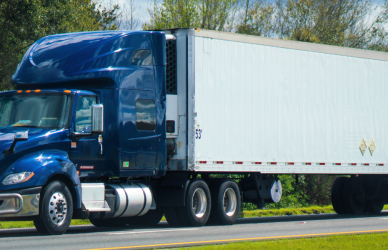Are you a trucker considering venturing into the world of cross-border trucking? This type of work can offer lucrative opportunities, but it also comes with unique challenges and considerations. In this article we hope to provide you with valuable insights to help you navigate this exciting industry.
Pros and Cons of Cross-Border Trucking
Before embarking on any career path, it’s important to weigh the advantages and disadvantages. Let’s take a closer look at some pros and cons below.
Pros
- Lucrative Opportunities – Cross-border trucking often provides higher earning potential due to longer distances and increased demand.
- Expanded Market Access – You can tap into new markets, transporting goods across borders and contributing to global trade.
- Variety in Routes – Cross-border trucking allows you to explore diverse routes, offering a change of scenery and new experiences.
- Cultural Exposure – Interacting with different cultures and customs can broaden your horizons and enhance your cultural understanding.
Cons
- Regulatory Complexity – Navigating the various regulations, permits, and compliance requirements can be complex and time-consuming.
- Increased Administrative Tasks – Cross-border trucking involves additional paperwork, such as customs documentation and border crossing procedures.
- Language Barriers – Communicating with officials, clients, and fellow truckers in different languages can present challenges.
- Longer Driving Hours – Extended distances may result in longer driving hours, leading to potential fatigue and increased safety risks.
Regulations and Compliance in Cross-Border Trucking
Compliance with regulations is crucial for a successful cross-border trucking career. Here are key aspects to consider:
- Licensing and Permits – Familiarize yourself with the specific licenses and permits required for cross-border operations, such as the International Registration Plan (IRP) and International Fuel Tax Agreement (IFTA).
- Customs Documentation – Understand the necessary paperwork, including commercial invoices, bills of lading, and customs declarations, to ensure smooth customs clearance.
- Safety Regulations – Adhere to safety regulations such as hours-of-service rules, weight restrictions, and vehicle inspections to prioritize safety on the road.
Understanding the Customs Clearance Process
The customs clearance process is a critical aspect of cross-border trucking. Here’s what you can expect:
- Documentation Preparation – Collect and organize all required customs documents, ensuring they are accurate and complete.
- Customs Inspection – Your truck may undergo inspections to verify compliance with customs regulations and to ensure cargo security.
- Duties and Taxes – Understand the potential duties and taxes associated with importing or exporting goods across borders.
- Border Crossing Procedures – Familiarize yourself with border crossing procedures, including submitting necessary paperwork and communicating with customs officials.
Success Tips for Cross-Border Truckers
- Stay Updated on Regulations – Cross-border trucking regulations can change frequently. Stay informed about updates and changes in customs procedures, licensing requirements, and safety regulations. Join industry associations and subscribe to relevant newsletters or websites to ensure you’re up to date with the latest information.
- Build Relationships – Foster strong relationships with customs officials, brokers, and freight forwarders who specialize in cross-border operations. Developing a network of reliable contacts can help streamline the customs clearance process, provide valuable insights, and enhance your overall experience.
- Efficient Trip Planning – Effective trip planning is crucial for successful cross-border trucking. Consider factors such as border wait times, traffic conditions, and rest areas when planning your routes. Utilize technology tools and resources that provide real-time traffic updates and optimize fuel efficiency to maximize your productivity.
- Embrace Technology – Leverage technology to simplify administrative tasks, track shipments, and enhance communication. Utilize digital documentation systems, GPS tracking, and mobile apps to streamline processes, stay organized, and improve efficiency.
- Cultivate Cultural Sensitivity: Cross-border trucking involves interacting with diverse cultures and customs. Approach interactions with respect, openness, and cultural sensitivity. Familiarize yourself with local customs, etiquette, and business practices to establish positive relationships with clients, customs officials, and fellow truckers.
- Efficient Time Management – Time management is crucial in all trucking, but especially in cross-border trucking. Optimize your schedule by planning for potential delays at border crossings, allowing ample time for customs procedures, and factoring in rest breaks. Effective time management will help you meet deadlines, minimize stress, and enhance your overall performance.
- Maintain Strong Communication – Clear and effective communication is key to success in cross-border trucking. If there is a language barrier where you are frequently traveling, take the time to learn key words and phrases in that language, this can save you time and frustration on you journeys. Maintain open lines of communication with dispatchers, clients, customs officials, and other stakeholders. Promptly respond to inquiries, provide updates on shipments, and proactively address any issues that may arise.
- Continuous Learning and Adaptation – The trucking industry as a whole is dynamic and constantly evolving, so this is a good practice no matter what and where you’re hauling. Stay curious and commit to continuous learning. Keep up with industry trends, technological advancements, and best practices. Adaptability and a willingness to embrace change will position you for long-term success.
Embarking on a cross-border trucking career can be both rewarding and challenging. By understanding the pros and cons, adhering to regulations, prioritizing safety, and being well-versed in the customs clearance process, you can position yourself for success in this dynamic industry. Stay informed, stay prepared, and embrace the opportunities that cross-border trucking has to offer.
Remember, being knowledgeable and informed will set you on the right path to navigate the intricacies of cross-border trucking and ensure a fulfilling and prosperous career.











